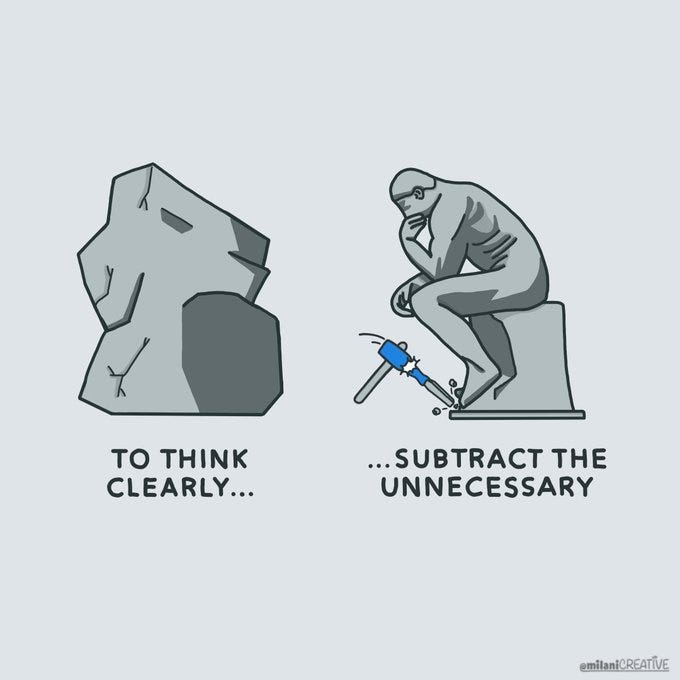Another tool!? Knowledge workers and adopting new tools.
Gifting your favourite workers new tools this holiday season...
It’s that time of year.
The tree is up, donations are out, socials are in full flow, and the (sustainable) e-cards are ready to go…
Leaving just a little remaining budget to gift those favourite knowledge workers in your lives - the researchers, analysts, designers, and consultants.
Especially given 70% of staff want better tools (Adobe’s State of Work 2023 report).
Of course, they would say that.
The challenge is… 1) Folks are already inundated with tools. 2) They’re also weighed down by tradition and workflows that don’t bend so easily to idealistic tech solutions.
A fact many firms (and consultants) grapple with as they roll the dice on their fave puzzle game. 'What tool stack will help our people deliver better'..
So, before you rush out for the latest hot tool, promising to help make work smarter... consider how you might use these two heuristics to make the change an enduring one.
Unwrapping the heuristics
Disclaimer: The two models outlined below won't be new to the change afficionados amongst you. But they’re interesting when combined. To experiment with what will both drive adoption and lower resistance.
The first model addresses barriers to change:
Dissatisfaction x Vision x First Steps < Resistance (Beckhard and Harris) suggests that folks need friction with current tools. Plus, clarity on what a new solution gives them, and pragmatic quick wins. This helps tackle natural resistance.
The second model focuses on the behaviors we want to encourage:
Capability + Opportunity + Motivation = Behaviour (Michie, van Stralen, and West) suggests that using a new tool (effectively), requires the right skills, attitude, and support. Folks react to the perceived impact + time it’ll take to learn and apply the tool.
Put another way...
Why this matters?
New tools can increase impact. Yet, they often stumble on the first hurdle.
People hate change. Even good change. We all pay lip service to the wonders of innovation, but we like what we know, and we aren’t keen to learn new tricks.
Tools need to be tailored to the company culture and the rollout thoughtfully curated. Over-index on training to change behaviours, culture and processes.
No doubt you've experienced one or more of:
It worked okay in the pilot, or that small project... but it's definitely not scaling.
They said it'll be amazing, but I can't do half of what I could before.
Who's championing it? Because my lead is saying use (same-as-always)
I thought the bench would help with it...
Let's just stick it in Excel / PowerPoint...
Circumventing the above roadworks requires well-designed tools AND a black belt in change (or at least green).
Take knowledge management.
In practice, this spans numerous tools with unstructured data across chat, emails, docs, and multiple repositories.
When a team is deep into delivery, the last thing they want is the friction involved in finding relevant facts and insights.
Most search options lack the granularity to retrieve the specific slide or cell from a deck/spreadsheet/file. Or the UI/UX to help users quickly digest and apply it.
Instead, the default is a clumsy rollout of tech-first solutions that ends up powering up resistance, not enthusiasm.
This matters because the technology we use, impacts how we think.
For most consultants, this is 10-20 core apps. In the largest firms, 30+.
Given the majority are productivity & collaboration. It’s ironic that this level of app/ tab switching is more a recipe for energy sapping cognitive load.
A tool that’s not just for Christmas
So, what would a bold overhaul of the tools used for consulting work look like?
One view is to re-balance the tool-stack to give more equal weight to deep thought. Not just fast information exchange. Carve out shallow work from the foundational 'jobs' that delivery entails.

Using tools that support 1–3-hour chunks of intense focus on the fewest, most valuable work. Whatever that is for your firm (rocket science, grey hair, etc.).
A change desirable to some. less so for others. Hence the above models.
So this holiday season, as you look ahead to '24, and what could truly equip you for success. Take a moment to check if your vision, motivation, and capability building is bold enough to spark real work transformation.
That's the gift knowledge workers want most, no matter the packaging.
Work has changed. Expectations have changed. What defines optimal ways of working are being defined
Adobe State of Work, 2023




